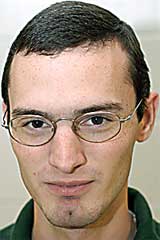Major news events often overshadow important happenings in world

T.J. Gerlach – Senior Editor
Sitting in the newsroom, scanning the Internet for ideas for a column, I ran across a few stories buried on CNN’s Web site.
This made me think.
Why is it, in the wake of some catastrophe or major news event, do many important news stories become unimportant.
I am not saying these often-tragic-yet-usually-not events do not need to be covered, but what I am saying is we cannot forget the other events happening in the world.
Does everyone know Chief Justice William Rehnquist died recently? How could anyone when the coverage of the destruction caused by Hurricane Katrina is still never-ending?
Rehnquist was an important figure in the United States, and some of the decisions he helped make will stand for ages.
Also, President George W. Bush now faces the task of finding a replacement for chief justice.
Another story coming to mind I heard about over the summer happened during the Michael Jackson trial.
I was watching ABC’s “Nightline,” and the show featured a story about another case happening at the same courthouse complex at the same time as the Jackson trial.
This other trial involved a triple murder and the defendant would be facing the death penalty if convicted.
This should have been a significant case, at least for the town of Santa Maria, Cal.
The “Nightline” reporter spoke with the family of the defendant and their thoughts on how the Jackson courtroom overflowed with reporters and how their courtroom had only one reporter from the local newspaper.
The report also showed the front page of that paper; Jackson’s trial occupied three-quarters of it while this case had just a few paragraphs on the bottom of the front page then jumped to an inside page.
Being a reporter, it is especially sad to see when disaster strikes, or some celebrity finds him or herself in trouble, all the networks, newspapers and free-lancers just trying to find that one story or angle that stands apart from the rest.
The truly depressing fact of it is these people are not trying to cover the event, but they are trying to win awards and acclamations.
With televised or radio reports, this may even lead to asking a source to redo an interview or scene that may be too emotional for them in the first place.
The result, of course, is an over-saturation of the event in the eyes of the public, who do not care about what story will win a Pulitzer.
What I am saying is this: take the news at face value.
The major news events can and should have expanded coverage time, but not to the extent the audience cannot find any other news at all.
But after an event has had its due time, only the needed parts of it are necessary – the rebuilding or reparation, so to speak.
Endless commentary on what this and that expert think went wrong or what they believe needs to happen is unnecessary.
Your donation will support the student journalists of Missouri Southern State University. Your contribution will allow us to purchase equipment and cover our annual website hosting costs.



























